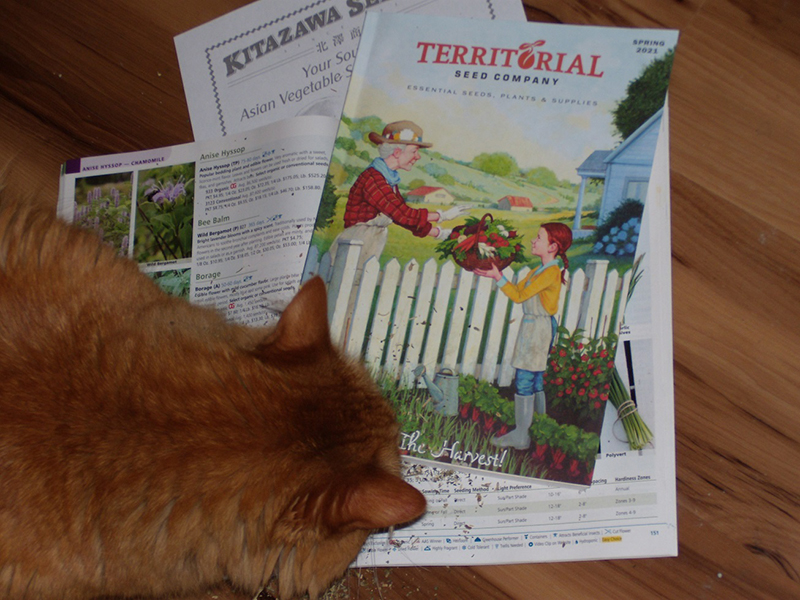by Margie Siegal
The holidays are over, but the pandemic is still here. It’s cold and wet outside. There’s no place to go. A depressing prospect… but if you buy mail order seeds, you are not sad and depressed. You are eagerly awaiting the year’s delivery of SEED CATALOGS.
Seed catalogs are the most concentrated dose of optimism ever to hit a mailbox. Each and every page shouts YOU CAN DO THIS! Ten minutes of seed catalog perusal will have you convinced that you too can grow award winning tomatoes, giant pumpkins and a flower border that will turn the neighbors as green as your lettuce. Your depressed feelings will be history.
There are several dozen mail order seed companies, and most specialize in a particular area of the seed world. There are catalogs that specialize in bulbs from Holland, catalogs that specialize in open pollinated seeds and catalogs that specialize in certain varieties of flowers. Dave’s Garden (https://davesgarden.com/products/gwd/) acts as a clearinghouse for kudos and complaints about mail order businesses. It is strongly suggested that you check with Dave’s first before you try a new-to-you seed company.
Some people are hesitant to start plants from seed. Farmers have been starting plants from seed for thousands of years. Most vegetables are not hard to start from seed, and the supplies for seed starting are not expensive. Most catalogs have a lot of tips and hints on how to get their seed to grow. If you buy starters, you are limited to a few standard varieties. If you buy seeds, you can get exactly what will work for you in this area. We have a long but cold growing season, which is not the situation with most of the USA.
Vegetables that need heat, like tomatoes and peppers, can be a challenge in Alameda, depending on your micro-climate. Large melons, which need hot nights, are not even in the picture, and don’t even think about tropical varieties like yard long beans and okra. When you order seeds, you can pick varieties that need minimum hours of heat. These plant varieties are often marked “early.” In Alameda, they won’t grow as fast as advertised, but they will grow, and usually ripen. Catalogs will also tell you which varieties of seed do well in cool weather.
Here are some seed catalogs I have bought from for years, and a few that are highly recommended by readers of Dave’s Garden:
- Kitazawa Seeds – https://www.kitazawaseed.com/ – One of the oldest seed companies in the US is right across the estuary in Oakland. The company specializes in Asian vegetables. They have 11 kinds of soybeans, Asian green stemmed cauliflower, the right kind of pepper to make Korean gochujang, and Vietnamese mint.
- Victory Seeds – https://www.victoryseeds.com/ Highly recommended by readers of Dave’s Garden, Victory, in Oregon, specializes in open pollinated seeds, with hundreds of varieties of tomatoes, culinary and medicinal herbs.
- Territorial Seed – https://territorialseed.com/ Territorial Seed, based in Cottage Grove, Oregon, sells seed that performs on the West Coast. They have an amazing selection of garlic, lots of lettuce and peas and a short list of tomatoes that you can expect to actually ripen in Alameda. The website has a lot of information, and a garden planner. Territorial is one of the few seed companies that puts out a winter gardening catalog, with a list of vegetables that will be happy out in January rain.
- Johnny’s Seeds – https://www.johnnyseeds.com/ The catalog from Johnny’s just showed up. It is a quarter inch thick. Johnny’s, an employee owned company that started in 1973, caters to smaller market growers as well as serious backyard farmers. Both the catalog and the website have a ton of information. With the focus on making money through farming, seed descriptions are more factual than many other catalogs.
- J. L. Hudson – https://www.jlhudsonseeds.net/ — Also highly recommended by Davesgarden.com, J. L. Hudson specializes in open pollinated, unusual varieties. The company considers itself a seed bank. They sell things you won’t find any place else: macadamia nut seed, Jewels of Opar flower seed, and Biscuit Root, an American native vegetable, for example. A warning on the website: some types of seed are challenging to germinate.
It may be raining and storming and cold outside, but you are inside and warm with your catalogs, a hot cup of tea and a cat trying to convince you to order a pound of catnip seed. In your mind’s eye you see your backyard in June, with the most bountiful garden ever. What could be better?

